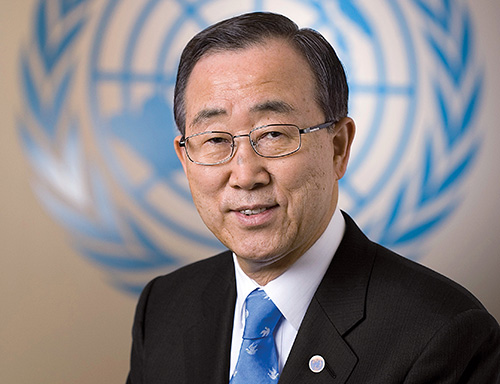 PROVIDENCE, R.I. [Brown University] — Ban Ki-moon, who served as the secretary-general of the United Nations from 2007 to 2016, will visit Brown University on Monday, Feb. 26, to deliver the Stephen A. Ogden Jr. ’60 Memorial Lecture on International Affairs.
PROVIDENCE, R.I. [Brown University] — Ban Ki-moon, who served as the secretary-general of the United Nations from 2007 to 2016, will visit Brown University on Monday, Feb. 26, to deliver the Stephen A. Ogden Jr. ’60 Memorial Lecture on International Affairs.
Brown University President Christina Paxson will introduce Ban prior to his presentation, titled “Sustainable Development Goals and Global Citizenship,” and moderate a question-and-answer session.
“Former U.N. Secretary-General Ban Ki-moon has dedicated his life’s work to combating climate change, fighting poverty, supporting gender equality and seeking peaceful resolution to international conflict,” Paxson said. “He is an inspiring role model who epitomizes Brown’s belief in the transformative power of courageous, independent thinkers.”
During his tenure at the United Nations, Ban pressed for action to combat climate change, an effort that culminated in the adoption of the landmark Paris Agreement in 2016. Ban worked closely with member states of the U.N. to shape the 2030 Agenda for Sustainable Development and to establish U.N. Women, advancing the organization’s work for gender equality and women’s empowerment. He also worked to strengthen U.N. peace operations, protect human rights, improve humanitarian response, prevent violent extremism and revitalize disarmament agenda.
In one of his last public appearances as U.N. secretary-general, Ban said: “This has been a decade in which collective action has changed hundreds of millions of lives for the better. Inclusive international cooperation solves problems, promotes peace and recognizes diversity as a strength.”
In September 2017, Ban was elected chairman of the International Olympics Committee ethics commission. He is also the honorary chairman at the Institute of Global Engagement and Empowerment at Yonsei University in Seoul, South Korea, and co-chair of the Ban Ki-moon Centre for Global Citizens in Vienna.
Before his U.N. appointment, Ban was minister of foreign affairs and trade of the Republic of Korea. His 37 years with the ministry included postings in New Delhi, Washington, D.C., and Vienna, and responsibility for a variety of portfolios, including foreign policy adviser to the president, chief national security adviser to the president, vice minister, deputy minister for policy planning and director-general for American affairs. Ban has also been actively involved in issues relating to inter-Korean relations by serving as chairman of the Preparatory Commission for the Comprehensive Nuclear Test Ban Treaty Organization.
Ban earned a bachelor’s degree in international relations from Seoul National University in 1970. In 1985, he earned a master’s degree in public administration from the Kennedy School of Government at Harvard University.
The Monday, Feb. 26, event at Brown will take place at 5 p.m. at the Salomon Center for Teaching’s DeCiccio Family Auditorium. It is free and open to the public, but tickets are required. The event will also be live-streamed on the Brown website.
[Editor’s Note: Tickets sold out on Wednesday, Feb. 7. Members of the news media who wish to attend and cover Ban’s visit should contact Brian E. Clark at [email protected] or (401) 863-1638.]
The Stephen A. Ogden Jr. ’60 Memorial Lecture
Since 1965, the Ogden Lecture Series has presented the University and its neighboring communities with authoritative and timely addresses about international affairs. The series was established in memory of Stephen A. Ogden Jr., a member of the Brown Class of 1960, who died in 1963 from injuries he suffered in a car accident during his junior year. His family created the series as a tribute to Ogden’s interest in advancing international peace and understanding.
Dozens of heads of state, diplomats, and observers of the international scene have participated in the series, including former prime minister of the United Kingdom David Cameron, former President of the Republic of Malawi Dr. Joyce Banda, Queen Noor of Jordan, former President of the Soviet Union Mikhail Gorbachev, former President of Brazil Fernando Henrique Cardoso, former Canadian Prime Minister Kim Campbell, former Australian Prime Minister Julia Gillard, economist Paul Volcker, Bolivian President Evo Morales, former Prime Minister of Italy Romano Prodi, His Holiness the Dalai Lama, World Bank President Jim Yong Kim, His Highness the Aga Khan, and human rights activist Kenneth Roth.